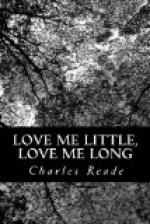“Where are the men of spirit? the men of action? the upright, downright men, that Heaven sends to cure us of our disingenuousness? Where are the heroes and the wits?” (an infinitesimal yawn); “where are the real men? And where are the women to whom such men can do homage without degrading themselves? where are the men who elevate a woman without making her masculine, and the women who can brighten and polish, and yet not soften the steel of manhood—tell me, tell me instantly,” said she, with still greater languor and want of earnestness, and her eyes remained fixed on the ceiling in deep abstraction.
“They are all in this house at this moment,” said Mr. Fountain, coolly.
“Who, dear? I fear I was not attending to you. How rude!!”
“Horrid. I say the men and women you inquire for are all in this house of mine;” and the old gentleman’s eyes twinkled.
“Uncle! Heaven forgive you, and—oh, fie!”
“They are, upon my soul.”
“Then they must be in some part of it I have not visited. Are they in the kitchen?” (with a little saucy sneer.)
“No, they are in the library.”
“In the lib— Ah! le malin!"
“They were never seen in the drawing-room, and never will be.”
“Yet surely they must have lived in nature before they were embalmed in print,” said Lucy, interrogating the ceiling again.
“The nearest approach you will meet to these paragons is Reginald Talboys,” said Fountain, stoutly.
“Uncle, I do love you;” and Lucy rose with Juno-like slowness and dignity, and, leaning over the old boy, kissed him with sudden small fury.
“Why?” asked he, eagerly, connecting this majestic squirt of affection with his last speech.
“Because you are such a nice, dear, sarcastic thing. Let us drink tea in the library to-morrow, then that will be an approach to—”
With this illegitimate full stop the conversation ended, and Miss Fountain took a candle and sauntered to bed.
In church next Sunday Lucy observed a young lady with a beaming face, who eyed her by stealth in all the interstices of devotion. She asked her uncle who was that pretty girl with a nez retrousse.
“A cocked nose? It must be my little friend, Eve Dodd. I didn’t know she was come back.”
“What a pretty face to be in such—such a—such an impossible bonnet. It has come down from another epoch.” This not maliciously, but with a sort of tender, womanly concern for beauty set off to the most disadvantage.
“O, hang her bonnet! She is full of fun; she shall drink tea with us; she is a great favorite of mine.”
They quickened their pace, and caught Eve Dodd just as she took a flying leap over some water that lay in her path, and showed a charming ankle. In those days female dress committed two errors that are disappearing: it revealed the whole foot by day, and hid a section of the bosom at night.




